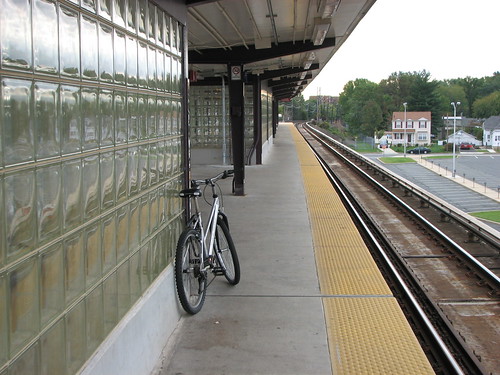by Andrew J. Besold
The New Jersey Transit Corporation’s (NJ TRANSIT) bicycle access program and its policies are consistent with the average North American industry practices and provide an acceptable amount of bicycle accessibility. Commuter trains along with the Hudson-Bergen and Newark Light Rail trains in northern New Jersey provide bicycle access to trains outside of peak, rush-hour periods and holidays. The River LINE and Atlantic City Line have no rush-hour or holidays access restrictions. All rail services reserve the right to limit bicycle access when trains are crowded and bicycles have to potential to interfere with passenger access. Unlike the Southern Service Region, bus service in the Northern Service Region currently lacks the ability to transport bicycles on urban buses. This will be remedied with the purchase of new buses with bicycle racks in the coming years. Bus routes in all service regions utilizing coach style buses have the capacity to transport bicycles in the underfloor luggage compartment. On-board, bicycle specific facilities are lacking on all commuter rail services as well as on the Hudson-Bergen and Newark Light Rail systems. Only the River LINE Light Rail service provides bicycle specific equipment to secure bicycles while on board the train.
NJ TRANSIT has bicycle parking capacity for roughly 2,300 bicycles. It also has capacity for approximately 375 bicycles in special bicycle lockers that are rented out on a monthly basis. While bicycle parking is provided at 90% of rail stations, 80% of light rail stations and at an undisclosed number of bus terminals, in most of these locations only the most basic, unsheltered bicycle racks are offered. While many of these racks are of the high quality inverted “U” style, unsheltered bicycle racks with no other security measures are an inappropriate solution when bicycles are expected to be parked for a period of greater than two hours. The lack of higher quality, more secure and sheltered bicycle parking facilities at stations may discourage many transit riders from using their bicycles to access NJ TRANSIT. The bicycle parking preferences of NJ TRANSIT passengers, particularly of those already accessing NJ TRANSIT by bicycle should be investigated. NJ TRANSIT should reevaluate its bicycle parking inventory and upgrade most bicycle parking to a sheltered option and investigate providing more high security options like, bicycle lockers, bike cages and bike stations at stations with appropriate demand and security concerns. All new station projects, renovations and upgrades should accommodate bicycle parking with at least the level of service provided by sheltered bicycle racks, with lower level of service bicycle parking only providing a spillover function.
NJ TRANSIT has bicycle parking capacity for roughly 2,300 bicycles. It also has capacity for approximately 375 bicycles in special bicycle lockers that are rented out on a monthly basis. While bicycle parking is provided at 90% of rail stations, 80% of light rail stations and at an undisclosed number of bus terminals, in most of these locations only the most basic, unsheltered bicycle racks are offered. While many of these racks are of the high quality inverted “U” style, unsheltered bicycle racks with no other security measures are an inappropriate solution when bicycles are expected to be parked for a period of greater than two hours. The lack of higher quality, more secure and sheltered bicycle parking facilities at stations may discourage many transit riders from using their bicycles to access NJ TRANSIT. The bicycle parking preferences of NJ TRANSIT passengers, particularly of those already accessing NJ TRANSIT by bicycle should be investigated. NJ TRANSIT should reevaluate its bicycle parking inventory and upgrade most bicycle parking to a sheltered option and investigate providing more high security options like, bicycle lockers, bike cages and bike stations at stations with appropriate demand and security concerns. All new station projects, renovations and upgrades should accommodate bicycle parking with at least the level of service provided by sheltered bicycle racks, with lower level of service bicycle parking only providing a spillover function.

NJ TRANSIT should investigate installing vertical hanging bicycle racks on all its commuter and light rail rolling stock that presently do not have them. The success of bicycle integration on-board the River LINE Light Rail may be due to the lack of time restrictions in which passengers can bring a bicycle aboard. However it is likely that this success is also due to the convenient and space efficient, vertical bicycle racks on-board all River Line trains that displace a minimal amount of passenger seats. Similar vertical bicycle racks on other NJ TRANSIT rail rolling stock would make better use of limited space, allow for greater passenger capacity while still accommodating bicycles and possibly minimize liability concerns and conflicts between passengers when bicycles are brought on board. Further detailed investigation into how on-board facilities can help accommodate bicycles more efficiently while also minimizing passenger conflicts should be conducted.
NJ TRANSIT does not proactively market to bicyclists who may want to use NJ TRANSIT to access weekend and recreational destinations. Most notable, is the very large and captive “car-free” populace of New York City. NJ TRANSIT should investigate offering special packages to entice bicyclists to use NJ TRANSIT’s services to reach their destinations. To help accommodate this, NJ TRANSIT should also investigate the conversion of some of its older passenger cars (that are scheduled to be removed from service) to transport large numbers of bicycles on peak weekends and holidays, particularly during the warmer months of the year.
more about biking:
No comments:
Post a Comment